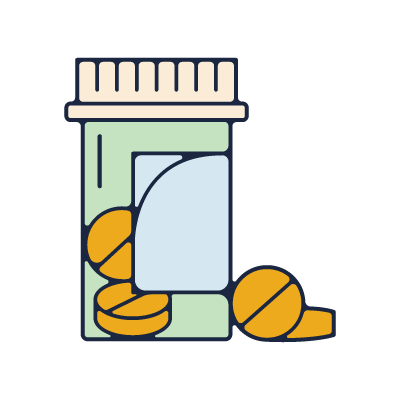Table of contents
1. Try To Find Your Balance
2. Eat A Diverse Range Of Foods
3. Eat Colorful Fruit and Veg, and a Lot of Fiber
4. Snack on Some Fermented Foods
5. Take It Easy on Red Meat or Alcohol
6. Don’t Forget to Exercise
7. Get a Good Night’s Sleep
8. Limit Your Use of Antibiotics
9. Maybe Top It All Off With Probiotics and Prebiotics
10. Take Care of Your Gut Health to Take Care of Your Vaginal Health
Illustrated by Erin Rommel, Sabrina Bezerra & Ralitza Nikolova.
Research has long shown that gut health is crucial for your overall health, going far beyond the gut, stomach, and intestines. Did you know that a healthy gut can also promote a healthy vagina? The bacteria in your gut and in your vagina are in sync through the “gut-vagina-axis”. As with many other aspects of gynaecological health, the link between the gut and vaginal microbiomes is under-researched, underrated, and underappreciated.

“It was probably Aristotle who said all health problems arise from your gut, and there's a certain amount of truth in that,” says Jeremy Nicholson, a professor of biological chemistry at Imperial College London specializing in gut health.
Nicholson explains that your gut health is based on your gut’s microbiome, the concoction of trillions of living bacteria hanging out in your gut and turning over about every two days. The more diverse the bugs are, the more thriving your gut health tends to be. Plus, those microbes are deemed “pharmacologically active” so they have an impact on the rest of the body too, like altering the production of hormones or deciding how you metabolize a drug.
“It's an incredibly complex, dynamic, partially malleable ecology… that's inside you,” says Nicholson. The bacteria living inside you are at the core of the complex interactions between diet, microbiome and overall health.
According to what your microbiome looks like, and which of those microbes are interacting more actively with the rest of your bodily systems — like your immune system, your nervous system — you may be more or less responsive to diets, drugs, lifestyle changes and so forth, says Nicholson.
So, for your gut health’s upkeep, there isn’t anything particularly radical you can do to get in stellar shape. It’s all about moderation, and diversity, and here’s a couple of tips to achieve that.
Try To Find Your Balance
Like most things in life, experts tend to believe that keeping a balanced and consistent lifestyle is at the core of keeping a healthy gut too.
“Consistency is key,” says Emil Hodzovic, MD, founder of Dr. Emil Nutrition. “Form healthy habits and daily routines to support a healthy gut. These could include getting out of the habit of snacking, especially late at night, and sleeping a full eight hours each night.”
So, try to have a balanced diet, a balanced work-life schedule, and a balanced sleep routine. All of these positive habits contribute to your body’s homeostasis — the technical term for biological balance — which in turn means your gut health will also be balanced.

Eat A Diverse Range Of Foods
Diet is probably the most important element to keeping a healthy gut, and in turn a healthy vaginal microbiome, so we’ll be covering a couple of strategies you can introduce to keep your gut + vaginal axis on point.
What’s most important is diversifying your diet: research has shown that consuming a lot of different foods can lead to a diverse microbiome, which is generally thought to be a healthy microbiome. In fact, studies have also shown that as the Western diet gets slimmer over time — with high quantities of processed foods — so does the vast array of healthy bacteria in our guts. That’s why some researchers are adamant to collect as many samples of different microbiomes from around the world before some gut bugs disappear from our world completely.
Nicholson notes that there has been a lot of interest in copying the diet of the inhabitants of Okinawa, in Japan, because researchers realized their diversity in fruits and vegetables was showing contributions to their overall health, and many Okinawans were centenarians.
So, how does one diversify their diet?

Eat Colorful Fruit and Veg, and a Lot of Fiber
Also try eating foods such as raw veggies, leafy greens, raw onions, leeks, asparagus and artichokes… and make sure to include some colorful fruits and veg in there too.
“Highly colored fruits and vegetables are actually good for you because the color comes from the particular pattern of unsaturation, and colored food often is very high in things that are actually antioxidants,” says Nicholson.
Whole grains have been shown to promote good gut bacteria, according to researchers. That good bacteria can also be increased by consuming foods like apples, artichokes, and blueberries. So much so that some studies suggest that eating plant-based, in fact, can lead to a healthier microbiome in general.

Snack on Some Fermented Foods
Some research also shows that fermented foods — when a food is fermented it basically means that it has been conserved with the help of yeasts and bacteria — benefit the gut flora.
“Supplement your diet with gut-healthy items such as probiotic foods, sauerkraut, yogurt, kefir and kimchi — and healthy fats, vitamins D, E and K, found in coconut oil, extra virgin olive oil and avocados,” says Hodzovic.
Yes, you read that right. Although saturated fats are unhealthy, and can cause disruption to your microbiota, there are some healthy fats which actually help your microbiota thrive. For example, omega-3 fats are shown to increase microbial diversity: think salmon, walnuts, sardines.

Take It Easy on Red Meat or Alcohol
“Things that are bad for your health are bad for your gut. Cut back on items such as added sugars, trans fats, heavily processed red meat, and alcohol,” says Hodzovic. “As always moderation is important.”
He also suggests trying to eat slowly. Eating slowly improves digestion by giving your stomach more time to break down food which improves your overall gut health.

Don’t Forget to Exercise
Exercise is important for a healthy lifestyle, therefore for a healthy gut too, according to studies.
“People who exercise regularly actually change their gut microbiome,” says Nicholson. “Because the hormones change in your body when you exercise, and that signaling changes the selection of the bacteria that are produced in the gut. So it's really straightforward stuff.”
That might be why professional athletes seem to have an exceptionally diverse gut.

Get a Good Night’s Sleep
“One of the most underrated things we can do to improve gut health is get a good night’s rest each night, while working on controlling stress levels,” says Hodzovic. “While the gut-sleep relationship is complicated, they are closely connected, in particular, healthy gut bacteria are linked to better sleep.”
In fact, this also helps chill out — which has, in turn, shown to be helpful to gut health. So much so that some scholars suggest it could be possible to help patients with PTSD by peering into their gut microbiome: in. a review of recent research, scientists noticed that problems in the gut microbiota during childhood could be linked with long-lasting immune consequences, including developing PTSD as an adult.
This is because of what scientists like to call the Gut-Brain-Axis — the two-way street that the central nervous system and the intestines communicate with, affecting the emotional and cognitive centres of the brain. In fact, a jumbled or scarce gut microbiome has been linked with depression and anxiety, loneliness, intuition, and more. That’s why we tend to say we’re having a “gut feeling”.

Limit Your Use of Antibiotics
Albeit being very necessary in a lot of medical and clinical case scenarios, doctors advise to stay away from antibiotics unless you need them, because they’re famed for depleting your gut’s healthy reserve of bacteria.
“Children or babies that have been given antibiotics in their first year of life, particularly boys, interestingly, are much more likely to be obese and diabetic when they grow older,” says Nicholson, like shown in this research meta-analysis right here. “So that antibiotic does a major reset in your microbiome.”
Because of how strong some antibiotics can be on your gut, depleting the microbiome, it’s suggested that you supplement with probiotics during and after a course of medication. Probiotics have been shown to decrease antibiotic-induced diarrhoea, and keep your microbiome strong against more diseases.

Maybe Top It All Off With Probiotics and Prebiotics
If you’re living a balanced and healthy lifestyle, eating a diverse range of foods and exercising — you should be good. But, if you want to add a little bit of extra strengthpsazz to your gut microbiome, you can also opt to supplement with probiotics or prebiotics. Those are, respectively, good bacteria to add to your gut, and compounds meant to help those good bacterias grow.
“So probiotics and prebiotics sort of are supposed to achieve the same thing, but they do, they do it in different ways. And it varies enormously between individuals — how they work or not,” says Nicholson.
Specifically, they’ve been shown to have a positive effect on people who have an imbalance, or gut problems which require some more bacteria diversity, but there’s yet to be a strong scientific case for the idea that probiotics and prebiotics can be used completely uniformly across whole populations to make your gut better, according to Nicholson.
But it doesn't hurt to try, with the guidance of your clinician, if that’s what you’re into!
Take Care of Your Gut Health to Take Care of Your Vaginal Health
Improving your gut health can also, ultimately, improve your vaginal health. Sometimes ‘bad bacteria’ from the gut can make its way to the vaginal microbiome and result in yeast infections or urinary tract infections — which could, in fact, be aided in treatment by the use of probiotics.
“The vaginal microbiome is actually complex and quite different to the gut microbiome, but it's actually microbiologically related,” says Nicholson. “Bugs can get from one place to another. So they influence each other in complicated ways.”
Although not much is yet known on the Gut-Vagina-Axis, it’s important to move forward with the idea that all microbiomes in the body are connected: so, say, diet, can also affect the health of the rest of your “epithelial surfaces”.
“It’s absolutely profound human biology, which is almost completely unknown to the general public and even doctors quite, quite frankly,” says Nicholson.
“This is the connection between the bugs and how you are born and in the way that you are brought up. Right,” says Nicholson. “How that influences your microbiome, which then influences all sorts of risk factors for everything from, from atopic disease to cancer.”






